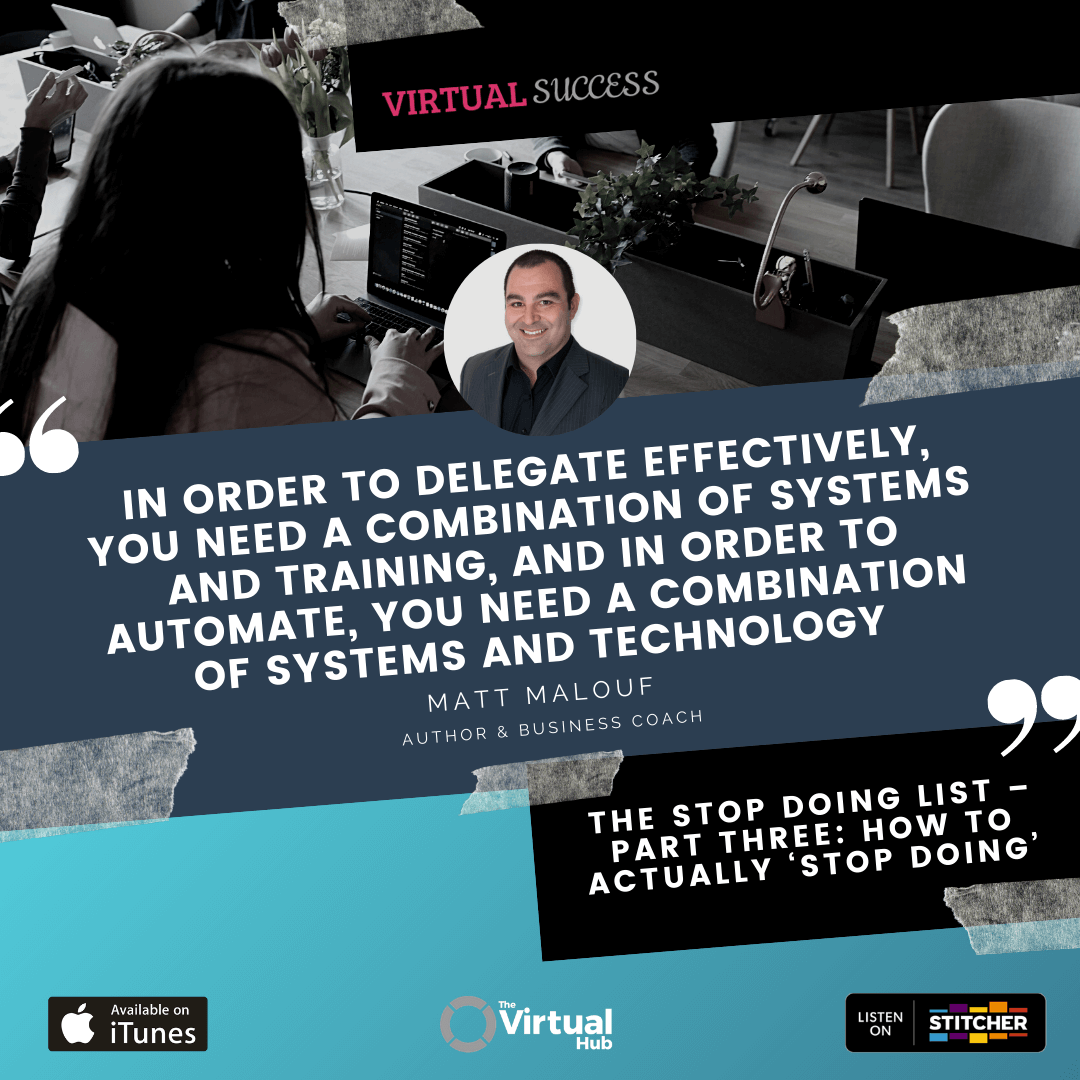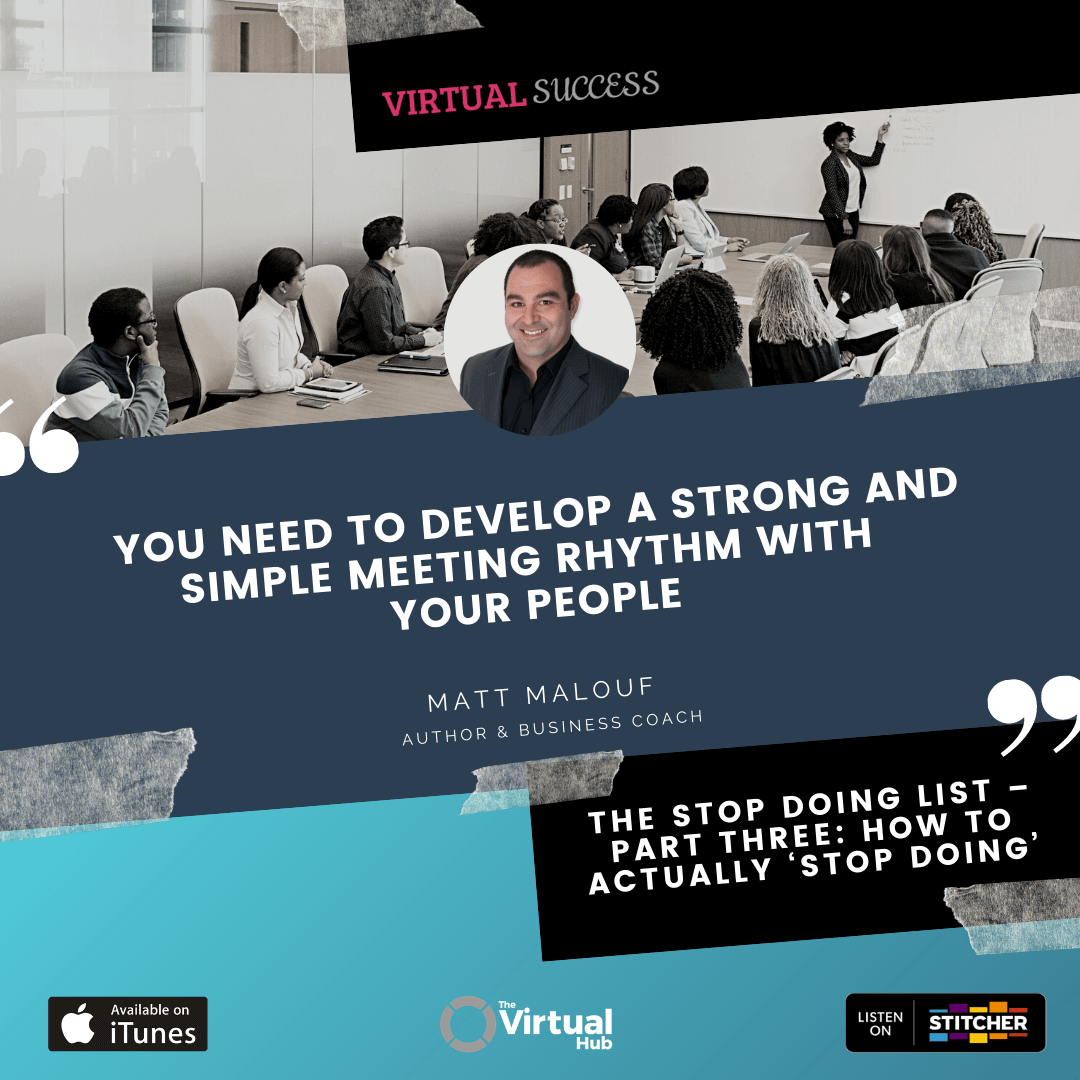The Stop Doing List – Part Three: How to Actually ‘Stop Doing’
Want the transcript? Download it here.
In the final episode of our three-part special on The Stop Doing List book, author Matt Malouf takes listeners through the final step in the process – how to actually ‘stop doing’ those tasks that are not in your genius.
During this episode, Matt focuses on the importance of the KRC model – Knowledge, Responsibility, Control – as without knowledge, we actually are unable to effectively be responsible or control any aspect of anything.
Some of the areas covered are:
- Understanding that without knowledge, we actually are unable to effectively be responsible or control any aspect of anything
- In order to start imparting knowledge and enable somebody else to take responsibility, there needs to be training systems and technology, and a blend of these, with systems being at the center of this
- To avoid tasks boomeranging back to you, you must invest time and money in the on going training of your team
- The importance of reporting and accountability once a task has been delegated
In this episode:
02:00 – How to actually ‘Stop Doing’
03:02 – The KRC model
04:38 – Linking the KRC
08:22 – Reporting and accountability
11:33 – Managing delegation
18:23 – Wrapping things up
Let us know what your key takeout has been from this episode and join the continuing conversation over in the Virtual Success Facebook Group.
Resources mentioned in this show:
The Stop Doing List – www.stopdoing.com.au
Barbara: Hey, everyone. Welcome back to another show of the Virtual Success Show where I’m joined by my co-host, Matt Malouf. How are you, Matt?
Matt: I’m well, Barb, and yourself?
Barbara: Good. Thank you. Good. Thank you. Really enjoying this series that we’re doing on your book, The Stop Doing List. I learn a lot every time I do this show, but it’s about refining things. Although I’ve gotten quite good at all these steps of delegation, and systems, and processes, and teams over the last few years I’ve been doing this, there’s always little bits that I learn more of when we do these shows and particularly from this series about The Stop Doing List.
Matt: Yeah. It’s interesting. I started writing the book two years ago. Obviously, we published it three months ago now. As you go back, and you remember, and you go, “Oh, yeah. We put that part in there.” I was also preparing for the show, you know, there’s things you forget that you put into the book, so it’s really great for me to go back and reiterate what I actually put in here as well.
Barbara: I think the point actually that it’s a good point we make here, and I’ve often said to clients, “Processes are not a one-time thing like, none of this stuff is you just set and forget. It’s a constant evolving process of mindset, ‘Stop doing. Stop doing. Stop doing.’” Okay. Today, we’re going to tackle part three of the book, which I think is probably one of the most important areas to get right and one of the areas we see a lot of clients getting tripped up in, which is actually how to stop doing.
How to actually ‘Stop Doing’
When you create your task list, you’ve got all your processes and systems in place, and you delegate, and you got the VA on board, and you’ve done everything you were told to do, and then this is the area where people often fall down. First of all, Matt, can you tell me why is that? What happens in the actual process of how to stop doing?
Matt: Yeah, and this was one of the most interesting parts to writing this book because I think many of us, myself included, have delegated and passed tasks on before, and it seems like that boomerang effect where they keep coming back to us. I was just intrigued and kept asking, “What is it? Why do these tasks keep coming back?” Then, in my research, I stumbled across what’s called the “KRC model,” the Knowledge, Responsibility, Control. It’s a model that is part of the Harvard Management System. I started reading, and I’m like, “I get it now. I understand.”
The KRC model
What the theory says is that without knowledge, we actually are unable to effectively be responsible or control any aspect of anything, and this is not just related to business. And so what I came to realise was we were passing these tasks unto others, yet, as business owners and entrepreneurs, we were the greatest knowledge holders, and our teams didn’t have the knowledge. Yet, we were asking them to take responsibility and control aspects of our business. And so I was like, “This is it. This is it,” but it was more than just this knowledge, responsibility, control piece because whilst that theory makes sense, I was like, “Okay. How do you now take that and put it into a methodology that can actually now ensure that you can stop doing these tasks?”
Barbara: It’s funny what I was thinking as you’re saying that. Often, a complaint we get from clients … not a complaint, more a feedback is, “Well, I want the VA to show more initiative or take more responsibility,” and I think, “Well, can you definite what exactly … Are they aware of what you mean by this, or are they … How have you communicated this, and what knowledge are you expecting them to have in all this sort of issues?” I think it falls into this whole “how to stop doing” thing where it’s actually really hard to stop doing unless you get this part right, which is this knowledge, responsibility, control thing that you talk about in your book.
Linking the KRC
Matt: Absolutely, and on page 93 of the book, there’s a diagram, which I termed “Linking the KRC” because it’s one thing to have, “Yeah, I’ve got to impart knowledge so that they can take responsibility and control, but again, how do I do that?”. And so the links were understanding that in order to start imparting knowledge and enable somebody else to take responsibility, there needed to be training systems and technology, and a blend of these, with systems being at the centre of this.
You see, in order to delegate effectively, you need a combination of systems and training, and in order to automate, you need a combination of systems and technology. In order to start enabling others to take responsibility and control aspects of your business, we needed to get clear systems, training, and the use of technology implemented into the business. One thing I really want to … as a big take-home. A lot of business owners are very good at creating systems, but they don’t actually create a system for training people in those systems.

Barbara: Yes.
Matt: There’s no training plan. There’s no methodology. There’s just, “Here’s a checklist or here’s a video. Go and watch it,” and that’s it, and you maybe have a conversation about it. If you look at big corporates, they invest millions of dollars into training their people to learn and grow constantly. Unless you’re committed to that, these tasks will keep boomeranging back to you.
Barbara: The training thing. Honestly. People just don’t want to do it. That’s what we find when clients come in. The clients that get the most success are those that invest. Again, all of this is investing time, energy, money, whatever it is that you want to do in training. Although, at Virtual Angel Hub, we actually have … We have our own like I’ve invested heavily in training of the agents.
You know they’ve got to come through a massive training programme on digital marketing and all this sort of stuff with us. Even with that though, they go to a client, but there are specific things for that client’s business that we can’t train them on, but those are really the tasks that will trip the two people up because there was no training or effective training given. There was just a task list given and that’s it. “Here’s now your responsibility.”
Matt: Just to add to that, I think part of it is avoidance. I think part of it is not knowing how to effectively train either.
Barbara: Yeah.
Matt: Yeah. Effective training is a skill in itself. Yeah, it enables … Sorry. It requires you to be an exceptional communicator and understand the steps to help people learn. And it’s interesting too, the one thing I love about Virtual Angel Hub and the team members we get from there is, number one, they’re trained, and number two, we are trained as entrepreneurs how to work with a virtual assistant too, and so it’s an invaluable service, but this training piece is so critical.
Barbara: I’m even thinking actually as we’re talking. There’s so much more we can do in that area of Virtual Angel Hub. We are planning to offer more based on the programmes you’re bringing out in this whole Stop Doing concept because I see it as such a pivotal thing in getting success for clients, so this is really crucial.
So training, obviously, I know is one thing, but as you point out … I’m looking at the diagram here on page 93 of the book, and what I love is that you’ve got reporting and accountability here as well, which is another area that people forget about or that trips them up.
Reporting and accountability
Matt: Absolutely, and this is in that sort of linkage between responsibility and control. If there’s not effective reporting and accountability, then how will you know if somebody is, a) doing things when they should be doing them?, and b) doing them to the level that you expect them to do it? This is like a feedback loop to enable the original knowledge holder to understand that what needs to get done is getting done in the right way at the right time, and so these are simple either daily, weekly, or monthly reports, depending on the role and the task, but again, it’s a simple…
Barbara: You know what as well?
Matt: Yeah.
Barbara: In this as well because some people will… I know the mindset of some people listening to this. They’ll say, “Ugh, but I just don’t want to micromanage someone,” so I’m going to use an example of… Everybody needs a level of accountability, so even when we work with business coaches ourselves as business owners or we set strategies for ourselves, how many times do we fall off the perch or go off the board, and we’d love to have somebody to keep us accountable?
A lot of this is not that somebody needs to be micromanaged. It’s more just like a collaboration thing. It’s teamwork. It’s building a culture within your company of people being involved together to get to an outcome, and that’s where this reporting and accountability thing I think you can change your mindset on that from micromanaging.
Matt: Absolutely, and even … To go just one step further, most employees don’t understand what’s expected of them.
Barbara: Yes.
Matt: If they’ve got a report that they have to submit and they’re held accountable, they’ve got clarity on what’s expected and when it’s expected of them. It’s a win-win, and believe it or not, if you look at surveys done, yeah, for employees, they crave accountability. They actually want it because they then can have a sense of achievement. They understand what needs to get done and when it needs to get done by. It can be done in a negative way, and that’s not what we’re recommending here. It’s going to be done in a supportive and collaborative way, but we all want to, in some way, shape, or form, be held to a high level of account.
Barbara: I would also add to that. Actually, a tip is not just saying how to do something, and the reporting lines, and all that. It’s why we’re doing it. I’ve noticed that even if it’s a simple task, if I explained to the VAs, “Well, the reason I want you to post tips, and quotes, and things on Facebook, for example, and consistently do it every week is because it actually increases our brand in the marketplace, people can see a little bit of what we’re about, and therefore, it leads to X, Y, and Z, which means we make more money, which means that your job and career growth can be this.” You know what I mean? It’s like tying it back into the greater vision and the strategy, and they get way more excited about it then.
Matt: Absolutely. Yeah. Again, simple … That can be part of the training of this as well.
Barbara: Yeah, I would add that to the training. Definitely, the why, why their role is important in the greater … It’s not just a cog in a wheel, it’s the greater scheme of things.
Managing delegation
Matt: Absolutely, and so the last linking piece is linking control back to the original knowledge holder, and this is management. This is where you need to develop a strong and simple meeting rhythm with your people, and it will vary from role to role and where they’re actually … You’re talking to these reports, you’re talking to these KPIs, and you’re working together to actually move everything forward. This is a really key piece because we spoke about the concept of abdication, “Here’s a task. Off you go. Go and do it…” That will always fail.

Barbara: Yeah.
Matt: Your role, as you stop doing these things, is to then manage. Again, as Barb was mentioning earlier, it’s not to micromanage. I don’t need you to be … You don’t want to be involved in that level. If you’re going to be, you might as well do it yourself, and that defeats the whole concept. The point is it’s knowing what’s getting done, when it’s getting done, and being able to guide and direct the person that’s doing it to do it the way you do it. Part of the management is teaching people how you think when you do the task and asking them questions to help them get a deeper understanding so that they can, again, gain greater knowledge so that they can do it to a level far greater than you ever will.
Barbara: You know what? I want to share a little story here, and it’s a tip in doing this. A lot of people view the word “management” – it has a bit of a negative connotation. It’s a bit like a babysitting thing. People don’t want to do … “Management” all of a sudden is a bit … So, what I’ve started doing with my team, and I just cannot express the magic that has come from this, and I just didn’t know what I was doing at the time, but I got a few … I started doing daily huddles.
Now, this is this whole scrum technique and huddle. Huddle is like a 10 to 15-minute daily meeting that is fast and everyone has to say what they’re stuck on. What I started doing was I started getting one of my team to lead the meeting instead of me, so it gives them a sense of … I see myself as part of the team as opposed to the manager of the team, so we all collaborate together, and my role in the team is to help where people are stuck, so all of sudden, everyone feels really good about this whole management thing that’s going on.
I’m not managing them, but I kind of am. I’m there to lead rather than just manage, and I think that’s a key thing that if you can flip the lid on that with your team, I have seen a massive increase in idea generation and not just productivity, but the ideas coming out has been magic from that move. I didn’t do it for that purpose. I did it more for productivity or for me to be more involved, but the result has been exceptional. I cannot express how good the results have been.
Matt: Yeah. Again, there’s countless stories like this. Yet, it’s such a simple mindset shift that Barb’s just described to you. Yet, it’s so powerful and has an exponential return to your business.
Barbara: Your people as well are far more honest and excited in that environment because you’re a member of the team as opposed to the boss, which is that flat structure thing. Maybe that doesn’t work for every business, but I’m more a fan of that myself, and that’s when you see people shine. They just really come out of their shells. They feel excited.
Matt: Just to add to this, so management is where at time, you’re going to have to have tough conversations.
Barbara: Yeah.
Matt: You’re going to have to hold people to a higher level of account. You’re going to have to show them where they’ve done the “wrong” thing. But it’s about helping them and helping them to get back on track, but also, with a good management rhythm and meeting rhythm, things don’t get too far down the track or off-track before you pick it up, and so by meeting regularly and talking to an agenda, not just having a chat, you’ll find that you’ll get greater cadence in your business and faster growth.
Barbara: I actually think you’ll have less of the tough conversations. You know why? What I found with my team, when we’re having these daily huddles, it’s very easy to see who the winners are, and the level of everybody lifts because they’re all going, “Oh, okay. I could do it that way,” and then the people who are either not interested or falling off the perch, there’s nowhere really for them to hide, so you will they’ll either resign or they’ll step up. Actually, I have found less difficult conversations because it’s very transparent who’s not lifting to the level that everybody else is.
Matt: Yeah.
Barbara: Yeah, so that’s a great … and it is tough to do this, guys, but it’s so worth it. When you follow these steps, it really is worth it. I learned this the hard way by myself, but this book just lays it all out for you and exactly what you need to do, so I think it’s pivotal for any business.
Matt: Thank you, and it’s keeping in mind that it’s not going to be any one thing.
It’s the combination of all of it. It’s that KRC model. It’s understanding that it’s a combination of training, systems, and technology with reporting, and accountability, and management that is going to enable you to stop doing. Unless you focus in and … It’s a formula, and it works time and time again. Unless you follow the formula, it will be hard. The things will stay on your list. They’ll keep boomeranging back to you, and what you’ll find is you’ll have to be working harder and harder, and you’ll put a ceiling on your growth, and you won’t enjoy your business.
Barbara: You’ll be hiring and firing all the time because you’ll blame your people.
Matt: Absolutely.
Barbara: I just want to make a point here that this KRC thing is completely the responsibility of the business owner and not the team.
Matt: Correct.
Barbara: In time, when your business gets bigger and you’re doing $10 million, you can hire a CEO to do this, or a general manager, or something, but this is really the job of the business owner, and like I would challenge any business owner to say, “If your team are failing and things are chaos in your business, it’s because you are not stepping up into this particular role, and the person that really you need to look at is yourself,” which is a very tough thing to say, but I’ve had to do it. Matt, you’ve had to do it. Really, the buck stops with you as the business owner to get this right.
Matt: Yes, absolutely. That’s true.
Wrapping things up
Barbara: Matt, listen. This series has been great. This has been a three-part series on The Stop Doing List book that Matt has recently published, and you can go to stopdoing.com.au. There’s lots of free resources over there. There’s links at the bottom of these shows to some of the resources that you can use to do this, and I would urge anyone… Get out, and buy the book, and take it on a holiday with you because honestly, I read it on a holiday, and I came back firing. I felt great.
Matt: Fantastic.
Barbara: I made some changes in my business. Also, guys, if you’re listening on iTunes, please give us a rating and a review. We’d love to get this show up the ranks in iTunes, and you can also join the conversation in our Facebook group, Virtual Success on Facebook, and let us know in there if you’re struggling with something or a topic you’d like us to cover in terms of teams, virtual teams, and virtual success. Until next time. Thanks, Matt.
Matt: Thank you, Barb, and thank you to all the listeners. Barb, thank you for interviewing me on the book. It’s been my pleasure.
Barbara: It’s been great. Okay. See you guys.
The Hosts
 Matt Malouf
Matt Malouf
Matt Malouf is a passionate business coach, speaker, author and entrepreneur on a mission to help entrepreneurs around the world break the shackles of mediocrity and reach new levels of personal and business success.
 Barbara Turley
Barbara Turley
Barbara Turley is the Founder & CEO of The Virtual Hub, a company that specializes in recruiting, training and managing superstar ‘Virtual Assistants’ in the social media, digital marketing and systems automation space.
